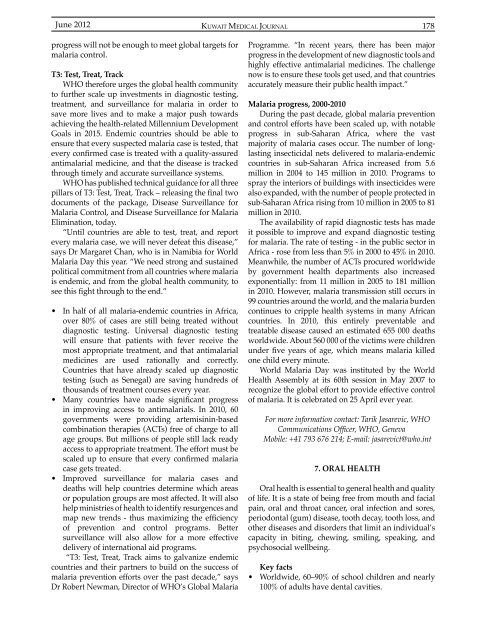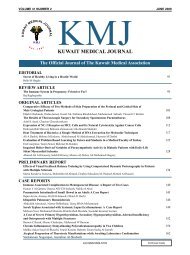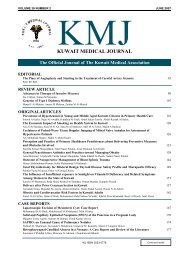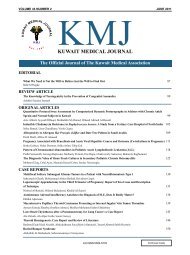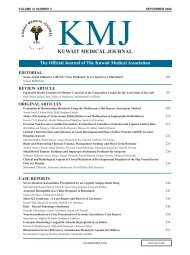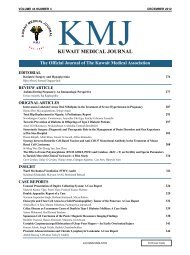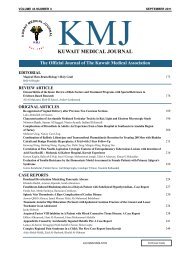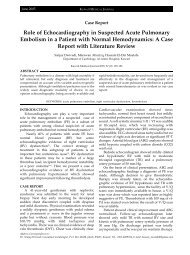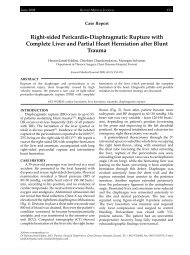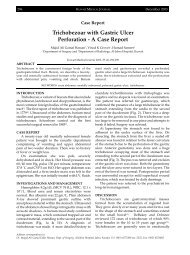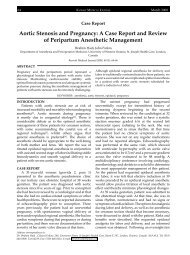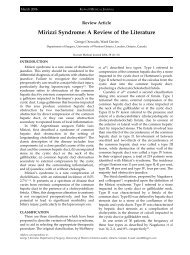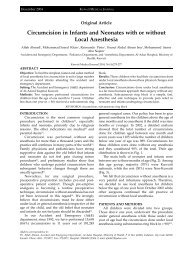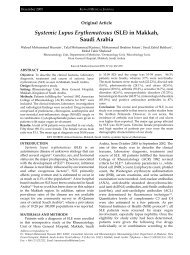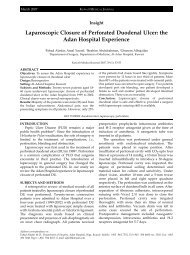Vol 44 # 2 June 2012 - Kma.org.kw
Vol 44 # 2 June 2012 - Kma.org.kw
Vol 44 # 2 June 2012 - Kma.org.kw
You also want an ePaper? Increase the reach of your titles
YUMPU automatically turns print PDFs into web optimized ePapers that Google loves.
<strong>June</strong> <strong>2012</strong><br />
KUWAIT MEDICAL JOURNAL 178<br />
progress will not be enough to meet global targets for<br />
malaria control.<br />
T3: Test, Treat, Track<br />
WHO therefore urges the global health community<br />
to further scale up investments in diagnostic testing,<br />
treatment, and surveillance for malaria in order to<br />
save more lives and to make a major push towards<br />
achieving the health-related Millennium Development<br />
Goals in 2015. Endemic countries should be able to<br />
ensure that every suspected malaria case is tested, that<br />
every confirmed case is treated with a quality-assured<br />
antimalarial medicine, and that the disease is tracked<br />
through timely and accurate surveillance systems.<br />
WHO has published technical guidance for all three<br />
pillars of T3: Test, Treat, Track – releasing the final two<br />
documents of the package, Disease Surveillance for<br />
Malaria Control, and Disease Surveillance for Malaria<br />
Elimination, today.<br />
“Until countries are able to test, treat, and report<br />
every malaria case, we will never defeat this disease,”<br />
says Dr Margaret Chan, who is in Namibia for World<br />
Malaria Day this year. “We need strong and sustained<br />
political commitment from all countries where malaria<br />
is endemic, and from the global health community, to<br />
see this fight through to the end.”<br />
• In half of all malaria-endemic countries in Africa,<br />
over 80% of cases are still being treated without<br />
diagnostic testing. Universal diagnostic testing<br />
will ensure that patients with fever receive the<br />
most appropriate treatment, and that antimalarial<br />
medicines are used rationally and correctly.<br />
Countries that have already scaled up diagnostic<br />
testing (such as Senegal) are saving hundreds of<br />
thousands of treatment courses every year.<br />
• Many countries have made significant progress<br />
in improving access to antimalarials. In 2010, 60<br />
governments were providing artemisinin-based<br />
combination therapies (ACTs) free of charge to all<br />
age groups. But millions of people still lack ready<br />
access to appropriate treatment. The effort must be<br />
scaled up to ensure that every confirmed malaria<br />
case gets treated.<br />
• Improved surveillance for malaria cases and<br />
deaths will help countries determine which areas<br />
or population groups are most affected. It will also<br />
help ministries of health to identify resurgences and<br />
map new trends - thus maximizing the efficiency<br />
of prevention and control programs. Better<br />
surveillance will also allow for a more effective<br />
delivery of international aid programs.<br />
“T3: Test, Treat, Track aims to galvanize endemic<br />
countries and their partners to build on the success of<br />
malaria prevention efforts over the past decade,” says<br />
Dr Robert Newman, Director of WHO’s Global Malaria<br />
Programme. “In recent years, there has been major<br />
progress in the development of new diagnostic tools and<br />
highly effective antimalarial medicines. The challenge<br />
now is to ensure these tools get used, and that countries<br />
accurately measure their public health impact.”<br />
Malaria progress, 2000-2010<br />
During the past decade, global malaria prevention<br />
and control efforts have been scaled up, with notable<br />
progress in sub-Saharan Africa, where the vast<br />
majority of malaria cases occur. The number of longlasting<br />
insecticidal nets delivered to malaria-endemic<br />
countries in sub-Saharan Africa increased from 5.6<br />
million in 2004 to 145 million in 2010. Programs to<br />
spray the interiors of buildings with insecticides were<br />
also expanded, with the number of people protected in<br />
sub-Saharan Africa rising from 10 million in 2005 to 81<br />
million in 2010.<br />
The availability of rapid diagnostic tests has made<br />
it possible to improve and expand diagnostic testing<br />
for malaria. The rate of testing - in the public sector in<br />
Africa - rose from less than 5% in 2000 to 45% in 2010.<br />
Meanwhile, the number of ACTs procured worldwide<br />
by government health departments also increased<br />
exponentially: from 11 million in 2005 to 181 million<br />
in 2010. However, malaria transmission still occurs in<br />
99 countries around the world, and the malaria burden<br />
continues to cripple health systems in many African<br />
countries. In 2010, this entirely preventable and<br />
treatable disease caused an estimated 655 000 deaths<br />
worldwide. About 560 000 of the victims were children<br />
under five years of age, which means malaria killed<br />
one child every minute.<br />
World Malaria Day was instituted by the World<br />
Health Assembly at its 60th session in May 2007 to<br />
recognize the global effort to provide effective control<br />
of malaria. It is celebrated on 25 April ever year.<br />
For more information contact: Tarik Jasarevic, WHO<br />
Communications Officer, WHO, Geneva<br />
Mobile: +41 793 676 214; E-mail: jasarevict@who.int<br />
7. ORAL HEALTH<br />
Oral health is essential to general health and quality<br />
of life. It is a state of being free from mouth and facial<br />
pain, oral and throat cancer, oral infection and sores,<br />
periodontal (gum) disease, tooth decay, tooth loss, and<br />
other diseases and disorders that limit an individual’s<br />
capacity in biting, chewing, smiling, speaking, and<br />
psychosocial wellbeing.<br />
Key facts<br />
• Worldwide, 60–90% of school children and nearly<br />
100% of adults have dental cavities.


